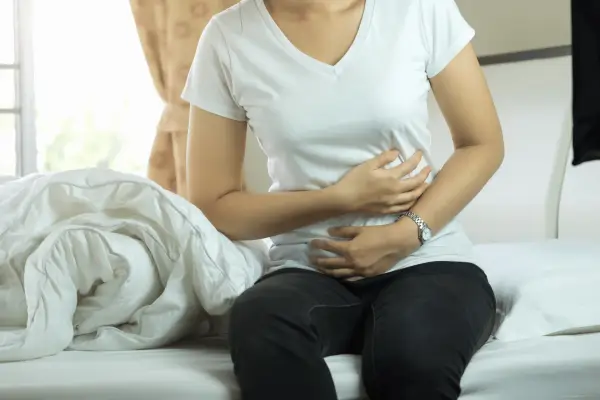![Healthy Matters]() Pharmacist Tips | Dosages | Side effects
Pharmacist Tips | Dosages | Side effects![Healthy Matters]() Nutritionist Tips | Facts | Precautions
Nutritionist Tips | Facts | Precautions![Healthy Matters]() Practitioner Tips | Dosages | Side effects
Practitioner Tips | Dosages | Side effects![Healthy Matters]()
![Healthy Matters]()

Gastritis: The Presence of H. Pylori?
4 min read

Gastritis is an inflammation of the stomach lining. Many people with gastritis do not have any symptoms. However, if left untreated, 10-15% will develop more severe complications of gastritis requiring medical attention. Let’s get to know more about gastritis.
What is gastritis?
Your stomach has a protective lining of mucus on the mucosa. It protects your stomach from the strong stomach acid that is needed to digest food. When the protective lining gets damaged or weakened, the mucosa becomes inflamed, i.e. gastritis.
Gastritis can be either acute with severe and sudden attacks that only last for a couple of days, or it can be chronic with long-term discomfort.
Gastritis vs. gastroenteritis: What is the difference?
Gastritis and gastroenteritis sound vaguely similar but they are quite different.
- Gastroenteritis is inflammation of the stomach and bowel, caused by an infection, resulting in vomiting, diarrhea and abdominal pain
- Gastritis is inflammation of the stomach lining specifically, and not always caused by infection
Gastritis symptoms and signs
Many people with gastritis do not have symptoms. The most common symptoms of gastritis include:
- Pain or burning sensation in the upper abdomen (belly)
- Nausea and vomiting
- Indigestion
- Loss of appetite
- Unintentional weight loss
- Vomiting blood
- A black, tarry stool
Gastritis causes
Gastritis occurs when the stomach lining (mucosa) gets damaged. Many things can cause gastritis, including:
- Alcohol abuse - excessive alcohol consumption can irritate and erode the stomach lining
- Bacterial infection - Helicobacter Pylori (H.pylori), a bacteria found in the stomach lining that can weaken the protective coating. It is the main cause of chronic gastritis and stomach ulcers.
- Long-term use of some medications - steady use of:
- Non-steroidal anti-inflammatory drugs (NSAIDs) (e.g. ibuprofen, diclofenac, aspirin)
- Corticosteroids (e.g. prednisolone) can irritate the stomach lining
- Physical stress - a sudden severe illness, injury, or major surgery (commonly severe burns and traumatic brain injuries)
- Autoimmune disease - less commonly, the body’s immune system attacks healthy cells in the protective stomach lining
H. pylori gastritis
Helicobacter pylori (H. pylori) is the most common and important chronic digestive system infection in the world. In Hong Kong, approximately a third of the population is infected with this organism. It can lead to, not only gastritis but also a spectrum of other diseases including indigestion, stomach ulcer, and rarely, gastric cancer and stomach lymphoma.
H. pylori is readily treatable, although the increasing antibiotic resistance makes management even more challenging. Therefore, it is crucial not to ignore signs and symptoms flag-up by our body to allow early detection and optimize treatment regimes to improve disease outcomes.
Gastritis diagnosis
Your doctor will ask more about your symptoms and perform a physical examination. Your doctors may also order one or more of the following non-invasive or invasive tests to aid diagnosis:
- Blood tests - To check for antibodies titers that fight H. pylori bacteria
- Stool samples - To check for H. pylori bacteria in your stool
- Urea breath test (UBT) - It is a quick and simple test to do. During the test you will be asked to swallow a test pill, then blow it into a balloon-like bag. H. pylori bacteria turn urea into carbon dioxide. If you have the bacteria, this test will show an increase in carbon dioxide
- Upper gastrointestinal endoscopy - The gastroenterologist will insert an endoscope (long thin tube with a camera) from your mouth through your digestive tract into your stomach. Allows doctors to visualize and examine the stomach lining. You may also have a tissue sample (biopsy) taken from the stomach lining to test for infection
Gastritis treatment
Treatment for gastritis varies depending on the underlying cause. Your doctor will assess the condition and suggest the most appropriate and effective treatment including:
- Acid control medication (antacids) - Neutralise stomach acid and help relieve symptoms (e.g. Aluminium Hydroxide, Calcium Carbonate)
- Histamine (H2) blockers - Suppress the secretion of stomach acid (e.g. Famotidine, Ranitidine)
- Proton pump inhibitors
Treatment of H. pylori gastritis
A combination of one proton pump inhibitor (PPI) and two or more antibiotics is the backbone of H. pylori bacteria eradication.
The treatment course lasts 14 days. This treatment carries a success rate of around 80%, depending on the antibiotic-resistant rate in your locality. In some cases, it may be necessary to repeat the treatment. Doctors will usually recommend a repeat test in around four to six weeks in all patients.
Possible complications of gastritis
If left untreated, gastritis can increase your risk of developing some serious problems, such as:
- Stomach ulcer (gastric ulcer) - open sores on the stomach lining
- Anemia - H. pylori gastritis can lead to stomach ulcers that bleed, thereby lowering your red blood cells
- Stomach cancer (gastric cancer)
- Stomach lymphoma
Prevention of gastritis
Gastritis itself isn’t contagious, but the bacteria - H. pylori - can be contagious through the fecal-to-oral route. Therefore good hand hygiene especially before handling foods and proper sanitation can lower your risk of infection and transmission.
You can also take steps to prevent gastritis including:
- Reducing alcohol consumption
- Managing stress
- Quit smoking if you smoke
- Avoid food that can irritate the stomach (spicy food)
- Avoid overeating or irregular meal times
FAQs
You might not experience any symptoms with gastritis, but you might feel a burning sensation or pain in the upper belly, feeling of indigestion, nausea, vomiting, loss of appetite, weight loss, black and tarry stool, or vomiting blood.
In an acute attack, gastritis may last from days up to weeks. In chronic gastritis, it can develop gradually and last over a few months or years intermittently.
The most important thing you should avoid with gastritis is alcohol. You should also avoid smoking and eating foods that can trigger irritation in your stomach including spicy food.
Doctors will prescribe medications to help you ease the symptoms or the underlying bacterial cause of gastritis. These include antacids, histamine (H2) blockers, or proton pump inhibitors (PPI) to reduce stomach acidity. As well as antibiotics that can be used in combination with PPI to kill H. pylori bacteria.
This article was independently written by Healthy Matters and is not sponsored. It is informative only and not intended to be a substitute for professional medical advice, diagnosis or treatment. It should not be relied upon for specific medical advice.

Your health resource, made in Hong Kong
Healthy Matters is Hong Kong’s leading health resource. Our mission is to help you make better health decisions and take control of your health.
Our team of experts is committed to producing reliable health content that is accurate, engaging and relevant, to cover your health & wellness journey from prevention to treatment.
Whether you are looking for trusted information on health conditions, wellbeing or looking for the right doctor or service in Hong Kong, we’re here to help!
Your health matters. Begin your health journey with Healthy Matters today!
































